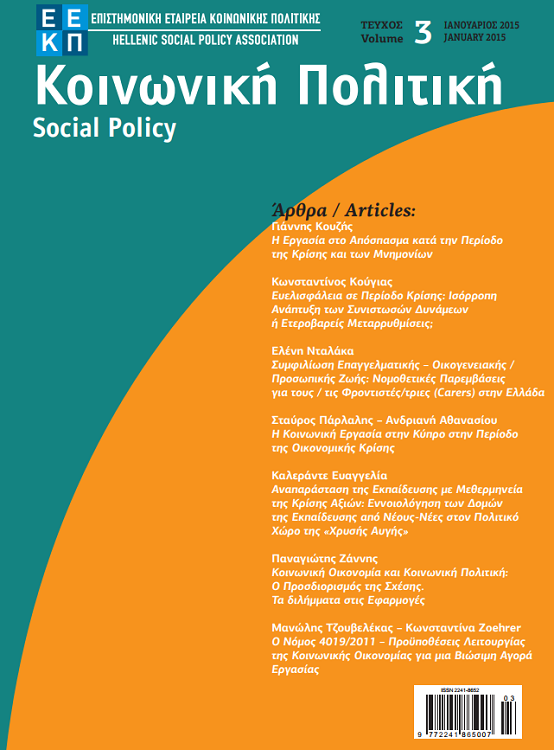Ευελισφάλεια σε Περίοδο Κρίσης: Ισόρροπη Ανάπτυξη των Συνιστωσών Δυνάμεων ή Ετεροβαρείς Μεταρρυθμίσεις;
Abstract
Η μελέτη επιχειρεί να διερευνήσει την εφαρμογή της ευελισφάλειας ως εργαλείο πολιτικής της αγοράς εργασίας την περίοδο της κρίσης του 2008 και της συνακόλουθης και παρατεταμένης ύφεσης στην Ευρωπαϊκή Ένωση. Μελετά τις βασικές διαστάσεις της έννοιας της, όπως αυτή αναπτύσσεται στο ενωσιακό θεματολόγιο, εξετάζει τις παρεμβάσεις στις αγορές εργασίας και τις υιοθετούμενες πολιτικές απασχόλησης στη Δανία, τη Γερμανία και την Ελλάδα και ερμηνεύει τα αποτελέσματα προσέγγισης /απόκλισης από τις αρχές της ευελισφάλειας, υπό το φως των ιδιαίτερων συνθηκών των εθνικών αγορών εργασίας και των πολιτικών λιτότητας που αποτελούν κοινό τόπο στον ευρωπαϊκό χώρο.
Article Details
- How to Cite
-
Κούγιας Κ. (2017). Ευελισφάλεια σε Περίοδο Κρίσης: Ισόρροπη Ανάπτυξη των Συνιστωσών Δυνάμεων ή Ετεροβαρείς Μεταρρυθμίσεις;. Social Policy, 3, 19–48. https://doi.org/10.12681/sp.10588
- Issue
- Vol. 3 (2015)
- Section
- Articles

This work is licensed under a Creative Commons Attribution 4.0 International License.
Authors who publish with this journal agree to the following terms:
Authors retain copyright and grant the journal right of first publication with the work simultaneously licensed under a Creative Commons Attribution Non-Commercial License that allows others to share the work with an acknowledgement of the work's authorship and initial publication in this journal.
Authors are able to enter into separate, additional contractual arrangements for the non-exclusive distribution of the journal's published version of the work (e.g. post it to an institutional repository or publish it in a book), with an acknowledgement of its initial publication in this journal.
Authors are permitted and encouraged to post their work online (preferably in institutional repositories or on their website) prior to and during the submission process, as it can lead to productive exchanges, as well as earlier and greater citation of published work.




